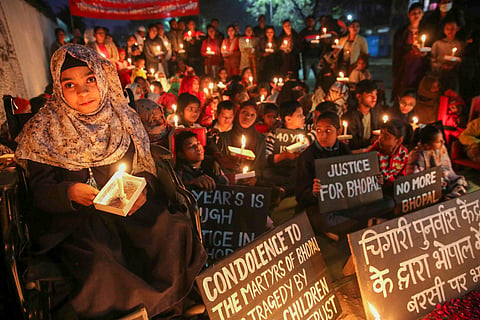

BHOPAL: Forty years after thousands of people died due to the killer gas leak at the Union Carbide India Limited (UCIL) pesticide plant in Bhopal, the city’s population affected by the December 2-3 1984 tragedy is not just prone to diseases induced by gas exposure, but many times more vulnerable to other ailments. These include lifestyle induced disorders like diabetes, hypertension and depression.
Data on patients has been gathered by a clinic run by registered NGO Sambhavna Trust for the last 28 years to render free long-term medical care to thousands of survivors of the gas leak. The data suggests that while the rate of several gas exposure induced diseases continues to remain higher among the tragedy’s survivors, there are several new diseases that are manifesting at a much higher rate among the gas exposed compared to the unexposed population.
Analysis of the clinical data of 16,305 gas exposed and 8106 unexposed patients who received care at the clinic in the last 16 years shows that the rates of diseases known to disproportionately affect gas-exposed populations, such as respiratory illnesses and mental health disorders, remained significantly higher throughout the last 16 years.
“Both obstructive and restrictive types of respiratory diseases were 1.7 to 2 times higher in the gas-exposed group compared to the unexposed population. Likewise, depression was observed to be 2.7 times more prevalent in the gas-exposed group compared to the unexposed group. Conditions not previously associated with gas exposure, like diabetes and hypertension, were curiously found to be consistently and significantly elevated over the last sixteen years. Diabetes was found to be five times higher among the gas exposed patients compared to the non-exposed. Likewise, hypertension was found to be over three times higher,” Dr Usha Arya, a physician at the clinic, said on Monday.
A middle-aged car driver, Mahesh Tiwari, who was just five years old when the gas leak happened, lost his job after repeatedly falling ill. “I’ve been jobless for the last three months after health problems that had been regularly affecting my work. Uncontrolled diabetes is the latest problem which has seen me losing the job,” said Tiwari, a native of Navjeevan Colony near the Chola Mandir area of the MP capital.
As per Dr Sonali Mittal, a gynaecologist at the clinic, “Several diagnoses were more prevalent in gas-exposed women. Hormonal conditions such as early and premature menopause were 2.6 times more frequent in gas-exposed women compared to those not exposed.”
Shirin Khan, one of the middle-aged survivors of the gas leak, lost her husband Jamil Khan (also a gas leak affected patient) two years back due to multiple problems. She is now herself afflicted with multiple problems, including gynaecological problems.
Expressing concern at the unfolding clinical picture of the survivors of the disaster, Dr B Raghuram, physician at the Sambhavna Clinic, said, “Kidney-related conditions, possibly triggered by the initial injury from Methyl isocyanate (MIC) gas leak exposure, have remained seven times higher in the exposed group. Acute conditions like myocardial infarction and ischemic heart diseases were found to be 4.5 times more prevalent in the gas-exposed population.”
Elaborating on the neurological conditions more prevalent among the gas-exposed patients, another physician at the Sambhavna Clinic Dr PK Aswathi said, “We find Hemiplegia and Neuralgia to be almost four times more common in the gas-exposed group. Neuropathy, likely influenced by factors such as diabetes, was found to be seven times more prevalent in the exposed population. We also find that Hypothyroidism, a metabolic disorder, has been rising over the past seven years in both populations but remains 1.7 times higher in the gas-exposed group.”
Summing up the findings of the clinical data, Dr Satinath Sarangi, who is the founder trustee and consultant of Sambhavna Trust, said, "The generation and analysis of the clinical information made possible by the efficient medical information system devised by our staff clearly shows a consistent pattern of higher morbidity in both known and emerging conditions among gas victims even in the fourth decade since the disaster. These observations highlight the continuing critical need for specialised health care of the Bhopal survivors."